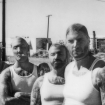Violent political uprisings. Socio-economic strife. The ever-chaotic state of climate change. And where do we go when we die? These are just a few of the big-ticket concepts racing through Vincent Bennett's brain these days. The Acacia Strain vocalist has stirred up some of this throughout the creation of his veteran metalcore-meets-deathcore unit's new two-album suite — comprising the mashed-and-manic STEP INTO THE LIGHT and its diametrically doomy and drawn-out sister set, failure will follow.
But, more often than not, he's haunted by these anxiety-inducing topics during much less public, and far more vulnerable, moments. As he tells it, every morning shower brings on an existential crisis.
"It's such a weird and wild place we live in right now," Bennett says through both a chuckle and a lingering cough from a recent case of on-tour bronchitis. "We could discover some form of technology tomorrow that could save the planet; or there could be an earthquake in Russia that sets off all the nuclear bombs, and then we go to war. You could lose your mind [thinking about it], and I do. Daily. Shower thoughts are very intrusive when it comes to stuff like that. Once you get to thinking about what could happen, it's a never-ending steam train of good and bad thoughts. That didn't really hit me until COVID happened."
All things considered, Bennett and the rest of the Acacia Strain seem to be in a great place overall. More than 20 years into their career, the group — currently rounded out by guitarists Devin Shidaker and Mike Mulholland, bassist Griffin Landa and drummer Kevin Boutot — are in a fruitfully prolific mood. With reverence to the title of STEP INTO THE LIGHT's introductory mosh-out, they're "FLOURISHING." Whether drilling into the disgustingly groove-heavy tenants of early deathcore or bravely branching off towards epic gloom, they're as germane as ever — a key influence among many in the new wave of heavy artists.
The Acacia Strain have been notably paying it forward the last few years: 2020's Slow Decay featured collabs with Spiritbox's Courtney LaPlante and Jesus Piece's Aaron Heard; and their latest two-album affair includes guest spots from members of Sunami, Full of Hell, Primitive Man and Chamber. Further to the point of their vitality, when Revolver reaches Bennett over Zoom, he's just come back from what he says was one of his band's best-ever headlining theater tours.
The Acacia Strain have long been known for their wild live shows: high-energy, cathartic events that both the band and the fans have come to count on over the years. But when the pandemic hit, the future for traveling acts — if not life in general — seemed abstract to Bennett, at best. To cope, he hit the outdoors.
Bennett grew up in Massachusetts and learned survivalist skills through a long and much-loved tenure in Scouts. These days he lives in Upstate New York near the Adirondack Mountains, which turned out to be a calming force during the early stages of the pandemic. "I rode my bike every day for a month," he recalls. "I was hitting high peaks left and right. I was going out in the mountains as much as I could, just trying to occupy my brain with fresh air. I've always been like that."
Fittingly, there's a naturalistic presence to the cover paintings for both STEP INTO THE LIGHT and failure will follow. With the former, a mother robin is found nurturing its nested younglings with what seems to be a feast of worms. Dramatic mountains and "high peaks" aside, for inspiration Bennett needed only to look out to his own backyard, which he says opens up into a broader wilderness of birds, deer, rabbits and uniquely screeching fisher cats.
But, like nature itself, there is duality on the two new albums — and everything isn't always a pastoral paradise. The heartwarmingly maternal aspects of STEP INTO THE LIGHT's album cover are upended by the other side of the diptych, with failure will follow presenting that same robin yanking maggot-infested innards out of a deer carcass. Pairing those visuals with Bennett's bleak in-song bellows on panicked d-beaters "FRESH BONES" and "UNTENDED GRAVES," it's fair to say death looms large on Acacia Strain's latest releases.

"It's one of those things that I try not to think about, lyrically, but it always ends up there," Bennett says. "When it comes to the record, it's not about dying; it's about hitting that next level. It may be perceived as death by some, but in reality [you're just] leaving your corporeal body behind and becoming whatever is next."
At one point during failure will follow's stonily sod-disturbing, 17-minute "bog walker," Bennett lets out an exhausted grunt of "I can't explain the darkness of the grave." While he may have yet to arrive at any conclusions, contemplating those unknowns has stirred an interest in the singer for as long as he can remember. "
My dad died when I was 10, and I was like, 'That can't be it,'" he reveals. "My mom raised me Catholic, but I stopped believing that when I was very young… So when my dad died, it was like, 'What happens — I wonder if there's truly nothing?' I've always been curious about how things work."
Bennett maintains he's not seeking easy answers for any of this. We could, like that deer, merely transcend as worm food, or fertilizer; or, Bennett theorizes, humanity could at some point evolve towards an ever-lasting consciousness by uploading itself to a Matrix-like mainframe. Either way, the simple act of inquisitiveness is reward enough for the frontman.
"I try and read these books on astrophysics, and it's way beyond my realm of understanding," he reveals through a parallel thought. "I still like reading it, though, because I like being confused and titillated. I like being intrigued by black holes, light speed and the fact that I'm looking at stars that are billions of years old."
The Acacia Strain was formed by a group of high school friends in Chicopee, Massachusetts, back in 2001, Bennett its only remaining original member. Since the release of an early demo and 2002's presciently titled …And Life Is Very Long album, the lineup has seen more than a dozen membership changes. Nevertheless, the Acacia Strain have plugged along steadily, transforming from early denizens of the deathcore scene to dependable elder statesmen of the broader heavy-music community.

On their previous album, Slow Decay, the act's veteran screamer reached out to a number of rising stars to add vocals, including Courtney LaPlante, Aaron Heard and Mortality Rate's Jess Nyx. The Acacia Strain likewise inject fresh blood into their newest recordings. Bennett trades gruff-throated barbs with Sunami's Josef Alonso on STEP INTO THE LIGHT slamfest "SINKHOLE;" while Full of Hell's Dylan Walker and Primitive Man's Ethan McCarthy add blood-curdling vocal ferocity to failure will follow's experimentally monolithic "pillar of salt" and "basin of vows," respectively.
The Acacia Strain's founding frontman takes comfort in connecting with the rising crop of hardcore heavy-hitters, first and foremost as a fan. He explains: "I don't want to draw inspiration from an old person. I am an old person! I draw inspiration from where the most passion is, where the heart of the music is, and where the most creativity is. And that is with the younger generation."
While STEP INTO THE LIGHT homes in on hallmarks of the Acacia Strain sound — gut-punching grooves, detuned riffage that'll stick in your teeth, and Bennett's proficiency with both hardcore-style hollering and the occasional pig squeal — across the board, the band set out to unlearn "what we had been taught we were supposed to do." But when the quintet first hit producer Randy LeBoeuf's Machine Shop facility in Belleville, New Jersey (it has since relocated to a barn location in Austin, Texas), Bennett admits that they were a little overwhelmed by how open-ended the sessions were looking — specifically because they didn't really have any material to work with.
"Trust me, when you go into the studio with no songs written, it's not a great feeling," he says, "You're like, 'Fuck… We've really hit zero here.'" Thankfully, the band started gelling on ideas quite quickly.
As a two-part set, there is natural cohesion between Acacia Strain's latest albums. Throughout, Bennett alludes to graves and humanity's fractured relationship with the rest of nature. ("There is no future with us in it," he poses on "FLOURISHING.") An unsettling melody the band fed into a vintage music box for the outro to "SINKHOLE" returns as a Rhodes organ section on "pillar of salt," and later as the sludgy, distortion-blaring grand finale of "basin of vows."
With regards to the exploratory nature of failure will follow, it's fair to say Acacia Strain have incorporated slow-mo moments into their overall catalog before, but those inky-chugged-out sections usually lasted a matter of seconds. failure's trio of tunes — existing as spaciously sinister drones, or emerald plumes of stoner-sludge imbibing Bongzilla, Melvins and Bennett's mom's old Sabbath records — each crack the 10-minute mark. STEP INTO THE LIGHT, comparatively, frantically crams 10 songs into 20 minutes. As Acacia's primary vocalist, failure's outsized run times had Bennett rethinking his approach.
"When it comes to a two-minute song, you're like, 'Boom, bang, boom — I'm done!' Six lines and it's over… but 'bog walker' [alone] is 17-minutes long," Bennett says, adding that he had to get into a particularly out-there headspace to conceptualize his comparatively novel-sized contributions. "It was a stressful part of my life. I locked myself in my basement, and I had shit everywhere — white pieces of paper with markers. I was running all over the place with the music on a constant loop. It was extremely chaotic, and when I was finally done with all of it, I just sat back in my chair and texted my band a picture of the [pages-long] lyrics for all three songs … I think it was the biggest achievement of my life."
More than two decades in, the band's ambitions are only growing. As they redefine their sonic parameters, it's clear that — disastrous, intrusive thoughts be damned — the Acacia Strain not only endure, but they're ready for whatever's next. Bennett, however, is much more pragmatic while framing the band's lasting appeal.
"I just think we're a mid-level band that's always been around — and we're never going away," he says, matter-of-factly. "Some people are sick of us; some people are happy that we still exist. That's really it!"












